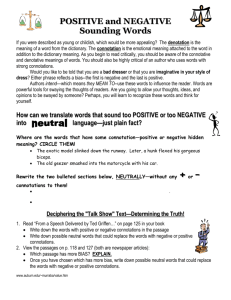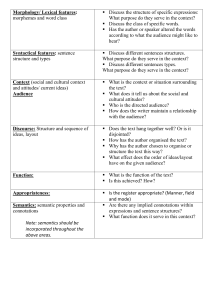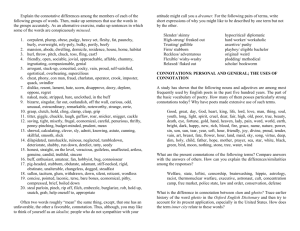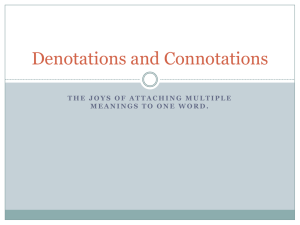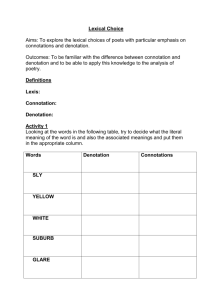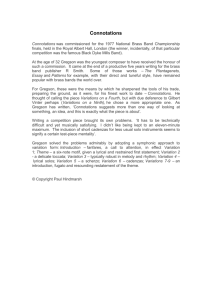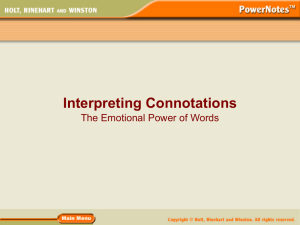A word
advertisement
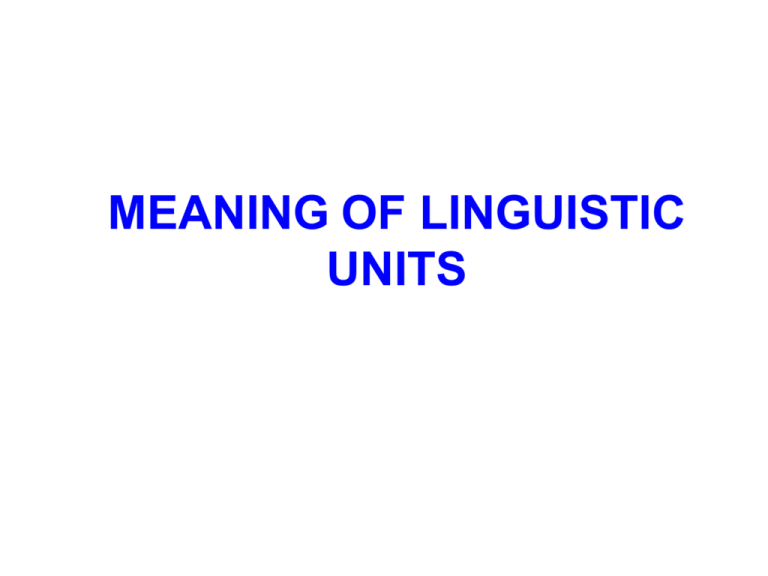
MEANING OF LINGUISTIC UNITS What Is a Word? A word is the basic unit of a language used for the purposes of human communication, possessing a meaning, materially representing a group of sounds, susceptible to grammatical employment (A.Meillet). The lexical meaning of a word is to denote a notion, emotion, or attitude by means of a linguistic system. LEXICAL MEANING 1. The information not connected with the process of communication (denotative) 2. The information connected with a) communicative situation, b) members of communication (connotative). Question: Which of the two meanings is obligatory and which is optional? Denotative meaning of a word • A word denotes a specific thing as well as a concept of a thing, i.e the word has a denotative meaning. • The word table denotes any object that is a table; it is the name of a whole class of objects that are tables. • The knowledge of the word-denotation is shared by all those who speak the given language (communication is possible). WHY CONNOTATIONS? Most words express ideas and since they stand for ideas they have connotations, even though they are often scarcely perceptible. That is because ideas themselves have connotations: they produce some sort of intellectual or emotional reaction inside us. TYPES OF CONNOTATIONS -1 1. Personal connotations: the result of the experience of the individual man or woman. E.g.: teacher. What is your personal attitude to a teacher? How was that attitude formed? 2. General connotations: the reaction to this or that word is substantially the same. E.g.: love, music, poetry; war, unemployment, jealousy, spite. TYPES OF CONNOTATIONS -2 3. Usual connotations are those which are fixed in dictionaries and understood by people in the same way: girl, smart, etc. 4. Occasional connotations are those appearing only in the context and sometimes changing the meaning to the unrecognizable. Thus, in some contexts the word maiden may sound ironical. Comment on the denotative and connotative meaning of this text: «Na rodinu t’anetsa tuča, Štop tol’ko poplakat’ nad nej» What is your emotional response? His [Dr Davidson’s] appearance was singular. He was very tall and thin, with long limbs loosely jointed, hollow cheeks and curiously high cheek-bones; he had so cadaverous an air that it surprised you to notice how full and sensual were his lips. (From Rain by S.Maugham) Connotative Meaning of Words • Emotive Component of the Meaning • Evaluative Component of the Meaning • Expressive Component of the Meaning • Stylistic Component of the Meaning Emotive Component • Linguistic expression : a) suffixes ie/y, e.g., birdie, Lizzie, Freddy. • No specific linguistic expression (but the concept of the word): dreadful, hairraising, terrifying, amiable, etc. • Words of purely emotive meaning, e.g. interjections: oh, ah, alas, hm, etc. NB!* Words denoting emotions or feelings! Evaluative Component • Positive or negative evaluation: Compare: time-tested method, out-of-date method. • Words with the evaluative components are called bias-words: hooligan, master, pushy (Who’s that pushy dame? Что это за напористая баба?) • I am firm, you are obstinate, he is pig-headed. Expressive component • The word creates an image • The word by its imagery emphasizes what is named by it • The image may be intensified by other words (syntactically connected with it): She was a thin, frail little thing, and her hair which was delicate and thin was bobbed … • Quantitative expressiveness: intensifiers. Stylistic component (or stylistic coloring) • The word possesses this component when it is typical for some functional style • Certain stylistic reference may suggest the character’s background: “Chief, you’re gonna force me inna roughin’ ya up a little bit. I don’t wanna do it, but that’s the way it looks,” he said. “You owe us five bucks*.” * For the word buck see the next slide. buck, n. Slang. a dollar. 1855-1860, Amer.; perhaps BUCK in sense «buckskin»; deerskins were used by Indians and frontiersmen as a unit of exchange in transactions with merchants [Webster’s Encyclopedic Unabridged Dictionary of the English language. – NY: Random House, 1996. – P.271.] Comment on connotations of the following words and phrases • • • • • • • Othello The Grapes of Wrath The Citadel A Farewell to Arms The Silver Spoon Woe from Wit The Green Years E.M.Hemingway Cat in the Rain There were only two Americans stopping at the hotel... Their room was on the second floor facing the sea. It also faced the public garden and the war monument. It was made of bronze and glistened in the rain. It was raining. The rain dripped from the palm-trees. Water stood in pools on the gravel paths. The sea broke in a long line in the rain and slipped back down the beach to come up and break again in the rain. Cat in the Rain (continuation) They did not know any of the people they passed on the stairs on their way to and from their room… There were big palms and green benches in the public garden. In the good weather there was always an artist with his easel. Artists liked the way the palms grew and the bright colors of the hotels facing the gardens and the sea. Italians came from a long way off to look up at the monument … The motor cars were gone from the square by the war monument. Across the square in the doorway of the cafe a waiter stood looking out at the empty square. Home assignment 1. The lecture in a blue file. 2. Altick R. Connotation // V.I.Prokhorova, E.G.Soshalskaya. Oral Practice through Stylistic Analysis. - M.: Vysšaya škola, 1979. - Pp.7-13. 3. Arnold I.V. Стилистика. Современный английский язык. - М.: Флинта: Наука, 2002. - С.150-162.
